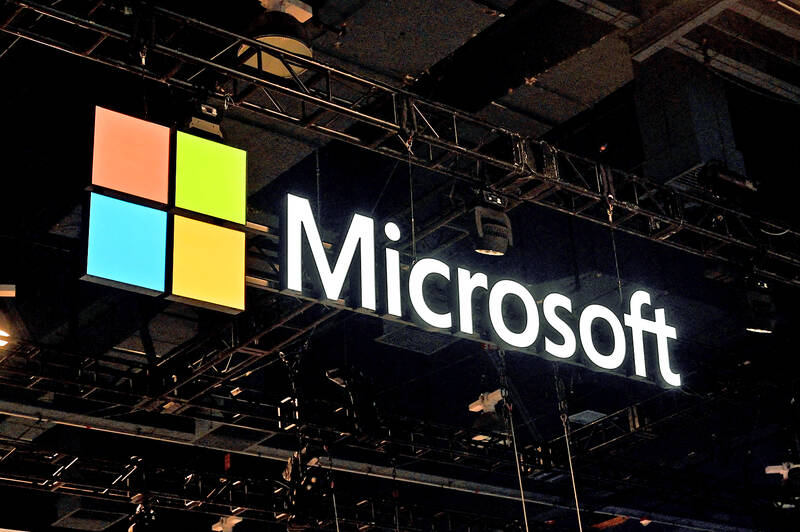Microsoft Corp is in discussions to invest as much as US$10 billion in OpenAI, the creator of viral artificial intelligence bot ChatGPT, people familiar with its plans said.
The proposal under consideration calls for the Redmond, Washington-based software giant to invest the money over multiple years, although the final terms might change, the people said.
The two companies have been discussing the deal for months, they added.

Photo: AFP
Semafor on Monday reported that the potential investment would involve other venture firms and could value OpenAI at about US$29 billion, citing people familiar with the talks.
Documents sent to investors had targeted the end of last year for a deal closing, it added.
Microsoft and OpenAI representatives declined to comment.
ChatGPT has lit up the Internet since launching at the end of November last year, gathering its first 1 million users in less than a week. Its imitation of human conversation sparked speculation about its potential to supplant professional writers and even threaten Google’s core search business.
The organization behind it, cofounded by Elon Musk and Silicon Valley investor Sam Altman, makes money by charging developers to license its technology.
The new technology is built on OpenAI’s GPT-3 language model and comes at the end of a year of headline-grabbing advances in artificial intelligence.
The company’s Dall-E image-generating model — which accepts written prompts to synthesize art and other images — also gave rise to a broad debate about the infusion of artificial intelligence into creative industries.
OpenAI is already working on a successor GPT-4 model for its natural language processing.
Microsoft has previously invested about US$1 billion in OpenAI. It is also working to add ChatGPT to its Bing search engine, seeking an edge on Alphabet Inc’s dominant search offering. The bot is capable of responding to queries in a natural and human-like manner, carrying on a conversation and answering follow-up questions, unlike the basic set of links that a Google search provides.
Still, concern about its accuracy — which Altman himself has said is not good enough for the bot to be relied on — has prompted caution about its premature use, and New York City schools have banned students from accessing ChatGPT.

CHIP RACE: Three years of overbroad export controls drove foreign competitors to pursue their own AI chips, and ‘cost US taxpayers billions of dollars,’ Nvidia said China has figured out the US strategy for allowing it to buy Nvidia Corp’s H200s and is rejecting the artificial intelligence (AI) chip in favor of domestically developed semiconductors, White House AI adviser David Sacks said, citing news reports. US President Donald Trump on Monday said that he would allow shipments of Nvidia’s H200 chips to China, part of an administration effort backed by Sacks to challenge Chinese tech champions such as Huawei Technologies Co (華為) by bringing US competition to their home market. On Friday, Sacks signaled that he was uncertain about whether that approach would work. “They’re rejecting our chips,” Sacks

Taiwan’s long-term economic competitiveness will hinge not only on national champions like Taiwan Semiconductor Manufacturing Co. (TSMC, 台積電) but also on the widespread adoption of artificial intelligence (AI) and other emerging technologies, a US-based scholar has said. At a lecture in Taipei on Tuesday, Jeffrey Ding, assistant professor of political science at the George Washington University and author of "Technology and the Rise of Great Powers," argued that historical experience shows that general-purpose technologies (GPTs) — such as electricity, computers and now AI — shape long-term economic advantages through their diffusion across the broader economy. "What really matters is not who pioneers

BUBBLE? Only a handful of companies are seeing rapid revenue growth and higher valuations, and it is not enough to call the AI trend a transformation, an analyst said Artificial intelligence (AI) is entering a more challenging phase next year as companies move beyond experimentation and begin demanding clear financial returns from a technology that has delivered big gains to only a small group of early adopters, PricewaterhouseCoopers (PwC) Taiwan said yesterday. Most organizations have been able to justify AI investments through cost recovery or modest efficiency gains, but few have achieved meaningful revenue growth or long-term competitive advantage, the consultancy said in its 2026 AI Business Predictions report. This growing performance gap is forcing executives to reconsider how AI is deployed across their organizations, it said. “Many companies

China Vanke Co (萬科), China’s last major developer to have so far avoided default amid an unprecedented property crisis, has been left with little time to keep debt failure at bay after creditors spurned its proposal to push back a looming bond payment. Once China’s biggest homebuilder by sales, Vanke failed to obtain sufficient support for its plan to delay paying the 2 billion yuan (US$283.51 million) note due today, a filing to the National Association of Financial Market Institutional Investors showed late on Saturday. The proposal, along with two others on the ballot, would have allowed a one-year extension. All three